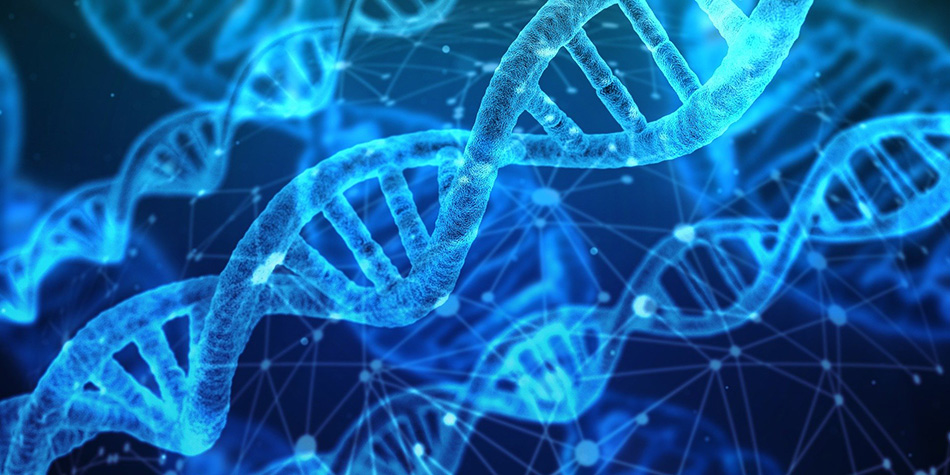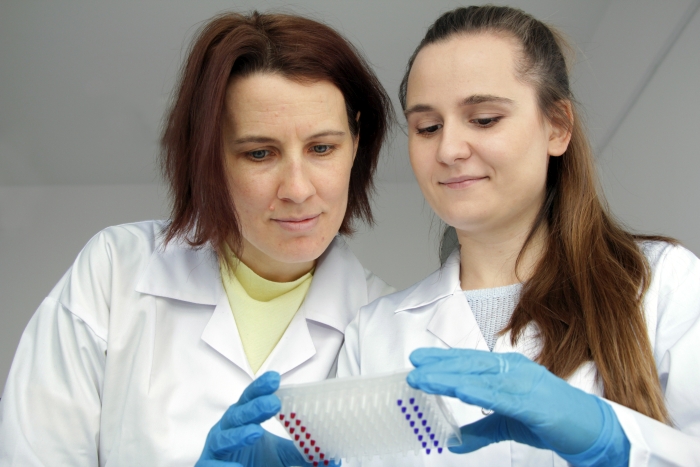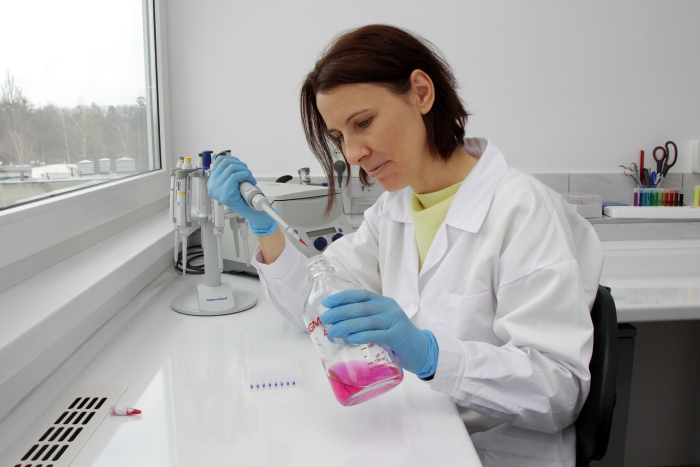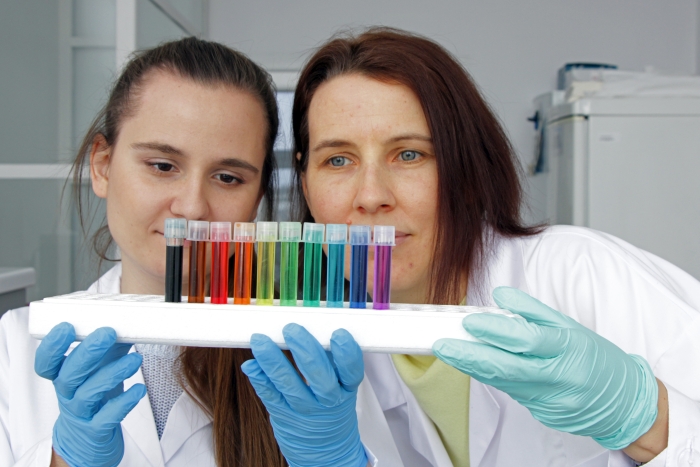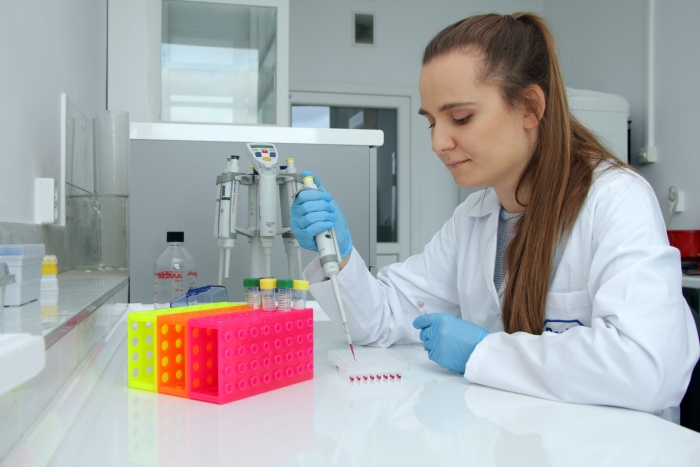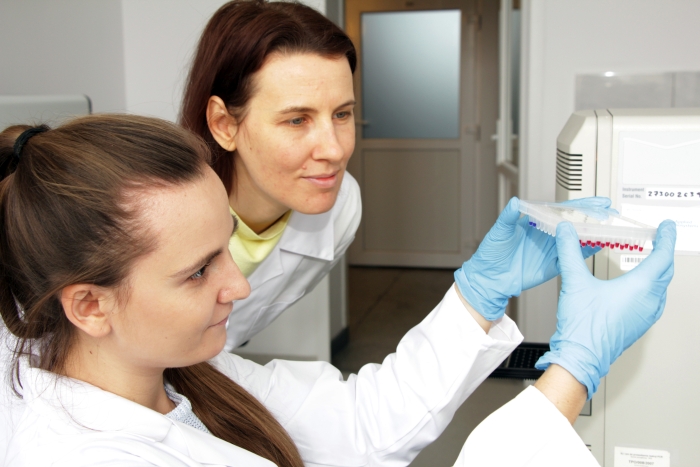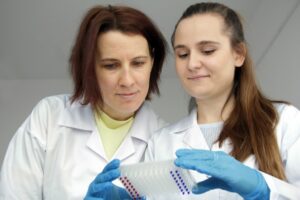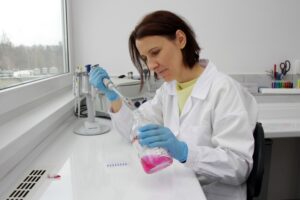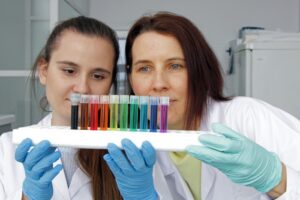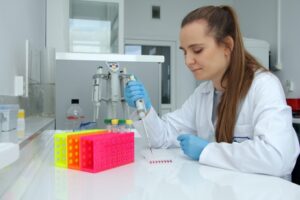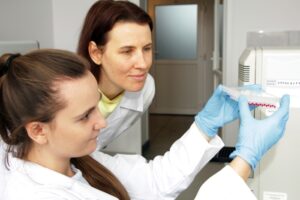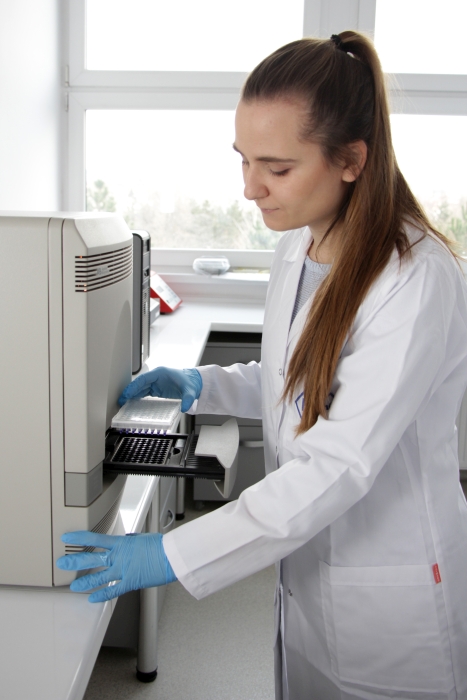 The subject of our research is the influence of genes polymorphisms encoding molecules that control immune responses to human reproductive failure as well as autoimmune, atopic and cancerous diseases.
The subject of our research is the influence of genes polymorphisms encoding molecules that control immune responses to human reproductive failure as well as autoimmune, atopic and cancerous diseases.
We study the participation of KIR genes (cytotoxic cell receptors, killer cell immunoglobulin-like receptors), the products of which inhibit or stimulate the functioning of the immune system cells: the so-called natural killer (NK) cells in the above-mentioned pathological states. There is also a subpopulation of T lymphocytes possessing on their surface KIR molecules which regulate their activity. Ligands (i.e. molecules capable of specific binding to the receptor) for KIR are molecules of the major histocompatibility complex, HLA (human leukocyte antigen), the so-called class I. HLA class I molecules bind the fragments (peptides) of proteins produced in the cell and present them to specialized CD8+ T lymphocytes which, upon recognition of foreign antigens, kill cancerous or virus-infected cells. HLA class I recognition by KIR receptors is also influenced by HLA-bound peptides. These peptides are processed in the cell by a number of proteins, incl. endoplasmic reticulum aminopeptidases (ERAPs), i.e. enzymes that cut off single amino acids from the amino end of the peptide.
Head: Izabela Nowak, PhD (associate professor IITD, (0000-0002-9127-1089)
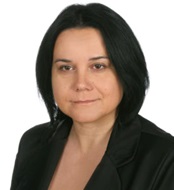 A graduate of Biotechnology at the University of Wrocław. She has been working in the Laboratory of Immunogenetics and Tissue Immunology since 1997. In 2009, she obtained a PhD degree in biological sciences. The title of the dissertation was: “Assessment of the association between KIR and HLA-C genes with susceptibility to spontaneous miscarriage”. She was awarded the postdoctoral degree (habilitation) in 2016 for the achievement entitled: “The role of KIR and HLA gene polymorphism in human reproduction and renal transplant rejection”.
A graduate of Biotechnology at the University of Wrocław. She has been working in the Laboratory of Immunogenetics and Tissue Immunology since 1997. In 2009, she obtained a PhD degree in biological sciences. The title of the dissertation was: “Assessment of the association between KIR and HLA-C genes with susceptibility to spontaneous miscarriage”. She was awarded the postdoctoral degree (habilitation) in 2016 for the achievement entitled: “The role of KIR and HLA gene polymorphism in human reproduction and renal transplant rejection”.
Her scientific achievements include 48 scienific papers. Izabela Nowak participated in the implementation of 9 grant projects (KBN, Ministry of Science and Higher Education, NCN), including managing 3. She presented the results of her research at national and international scientific meetings (65 announcements, including 6 oral presentations).
The research work and publications resulted in 7 awards, including 3 for publications with the highest impact factor. She was also a laureate of the Polish Intelligent Development Award 2019 under the patronage of the President of the Patent Office of Poland in the category: Scientist of the Future. Izabela Nowak has been a member of the Polish Immunogenetic Society since 2017, and since December 2018 she has been the Chairperson of the Society’s Audit Committee.
Scientific Staff:
- Prof. Piotr Kuśnierczyk, PhD, DSc, Professor (orcid.org/0000-0002-9224-8921)
- Andrzej Wiśniewski, PhD, Assistant Professor (orcid.org/0000-0002-1919-2298)
- Karolina Piekarska, PhD, Assistant (orcid.org/0000-0002-4175-965X)
Specialists:
- Wanda Niepiekło-Miniewska, PhD (orcid.org/0000-0002-3326-4059)
- Agnieszka Tarnowska, MSc, Eng (orcid.org/0000-0001-5208-9535)
PhD Students:
- Patrycja Bochen, MSc, Eng
- Determining of the association of HLA-G with recurrent implantation failure after in vitro fertilization. We know which variants predispose to greater secretion of the soluble HLA-G molecule by the woman, and thus have an impact on the proper implantation and maintenance of pregnancy after IVF.
- Discovery of the role of the KIR2DS1 gene, the HLA-C*05:01 allele and the change of the isoleucine amino acid to methionine at position 276 of the endoplasmic reticulum aminopeptidase 1 in the predisposition to atopic dermatitis. Ile276Met changes the activity of the enzyme towards the precursor of the peptide presented by HLA-C*05:01.
- Demonstration of the role of interaction of ERAP1 and ERAP2 endoplasmic reticulum aminopeptidases in influencing the risk of psoriasis depending on the presence or absence of HLA-C*06:02.
- Molecular biology, PCR, RT-PCR, HRM, RFLP
- ELISA tests, multiprofiling of analytes
- Real-Time PCR systems:7300 Applied Biosystems, Roche Lightcycler 480 II Real Time PCR
- Laminar chamber Heraeus
- Thermal cyclers: Biometra, Biorad, MJ Research
- Transilluminator Vilber-Lourmat
- Centrifuges
- Study of the association between the KIR and HLA genotypes and atopic dermatitis. Grant of the Ministry of Science and Higher Education N N402 254936, 2009-2012, Principal Investigator: Piotr Kuśnierczyk
- Searching for the association of schizophrenia with genes encoding KIR receptors and their ligands (HLA) ”. Grant of the Ministry of Science and Higher Education N N402 455238, 2010-2013, Principal Investigator: Andrzej Wiśniewski
- Association of the polymorphism of KIR2DL4, LILRB1 and HLA-G genes with spontaneous abortion. Grant of the Ministry of Science and Higher Education N N401 588340, 2011-2014, Principal Investigator: Izabela Nowak
- The role of the non-classical HLA class I antigen – HLA-G – and its receptors – LILRB1 and KIR2DL4 – in the incidence of non-small cell lung cancer. Grant of the Ministry of Science and Higher Education N N402 685040, 2011-2014, Principal Investigator: Piotr Kuśnierczyk
- Studies on the role of the KIR, LILR and HLA gene polymorphisms in the pathogenesis and clinical course of ankylosing spondylitis. Grant of the Ministry of Science and Higher Education N N402 641140 ”. 2011-2014, Principal Investigator: Edyta Majorczyk
- Polymorphism of the genes TNFSF13B, TNFSF13, TNFRSF17, TNFRSF13B and TNFRSF13C in chronic B-cell lymphocytic leukemia. Grant of the Ministry of Science and Higher Education, N N402 680940, 2011-2015, Principal Investigator: Monika Jasek
- Interactions between polymorphic variants of CD28, CTLA-4, CD80, CD86, CBLB, CD40, CD40L and ALCAM genes as a factor determining susceptibility to multiple sclerosis and the clinical course of the disease. Grant NSC Preludium 3, 2012/05/N/NZ6 / 03426, 2013-2015, Principal Investigator: Marta Wagner
- Association of the polymorphism of the KIR and LILRB genes and their ligands – HLA-C and HLA-G with recurrent implantation failure after in vitro fertilization. Grant NSC OPUS 7, 2014/13/B/NZ5/00273, 2015-2020, Principal Investigator: Izabela Nowak. Grant in a consortium with the Polish Mother’s Memorial Hospital Research Institute in Łódź, IIET PAS was a leader.
- Identification of new genetic factors and protein markers predisposing to developing non-small cell lung cancer in the Polish population. Grant NSC OPUS 8, 2014/15/B/NZ5/03517, 2015-2020, Principal Investigator: Piotr Kuśnierczyk
- The role of ERAP1 and ERAP2 endoplasmic reticulum aminopeptidases in recurrent implantation failure after in vitro fertilization in patients with different immune status. Grant NSC Preludium 15, 2018/29/N/NZ5/00940, 2019-2022, Principal Investigator: Karolina Wilczyńska.
- Association of Soluble HLA-G Plasma Level and HLA-GGenetic Polymorphism With Pregnancy Outcome of Patients Undergoing in vitro Fertilization Embryo Transfer. Nowak I, Wilczyńska K, Radwan P, Wiśniewski A, Krasiński R, Radwan M, Wilczyński JR, Malinowski A, Kuśnierczyk P. Front Immunol. 2020 Jan 14;10:2982. doi: 10.3389/fimmu.2019.02982.
- KIR and HLA-C genes in male infertility. Wilczyńska K, Radwan P, Krasiński R, Radwan M, Wilczyński JR, Malinowski A, Barcz E,Nowak I. J Assist Reprod Genet. 2020 Aug;37(8):2007-2017. doi: 10.1007/s10815-020-01814-6.
- Endoplasmic reticulum aminopeptidase 1 polymorphism Ile276Met is associated with atopic dermatitis and affects the generation of an HLA-C associated antigenic epitope in vitro. Niepiekło-Miniewska W, Mpakali A, Stratikos E, Matusiak Ł, Narbutt J, Lesiak A, Kuna P, Wilczyńska K,Nowak I, Wiśniewski A, Zwolińska K, Ponińska J, Płoski R, Szepietowski JC, Kuśnierczyk P. J Eur Acad Dermatol Venereol. 2019 May;33(5):906-911. doi: 10.1111/jdv.15449.
- The impact of HLA-G, LILRB1 and LILRB2 gene polymorphisms on susceptibility to and severity of endometriosis. Bylińska A, Wilczyńska K, Malejczyk J, Milewski Ł, Wagner M, Jasek M, Niepiekło-Miniewska W, Wiśniewski A, Płoski R, Barcz E, Roszkowski P, Kamiński P, Malinowski A, Wilczyński JR, Radwan P, Radwan M, Kuśnierczyk P,Nowak I. Mol Genet Genomics. 2018 Jun;293(3):601-613. doi: 10.1007/s00438-017-1404-3.
- The association of ERAP1 and ERAP2 single nucleotide polymorphisms and their haplotypes with psoriasis vulgaris is dependent on the presence or absence of the HLA-C*06:02 allele and age at disease onset. Wiśniewski A, Matusiak Ł, Szczerkowska-Dobosz A,Nowak I, Łuszczek W, Kuśnierczyk P. Hum Immunol. 2018 Feb;79(2):109-116. doi: 10.1016/j.humimm.2017.11.010.
- Killer cell immunoglobulin-like receptor gene associations with autoimmune and allergic diseases, recurrent spontaneous abortion, and neoplasms. Kuśnierczyk P. Front. Immunol. 29 January 2013. doi.org/10.3389/fimmu.2013.00008
- Killer immunoglobulin-like receptor (KIR) and HLA genotypes affect the outcome of allogeneic kidney transplantation. Nowak I, Magott-Procelewska M, Kowal A, Miazga M, Wagner M, Niepiekło-Miniewska W, Kamińska M, Wiśniewski A, Majorczyk E, Klinger M, Łuszczek W, Pawlik A, Płoski R, Barcz E, Senitzer D, Kuśnierczyk P. PLoS One. 2012;7(9):e44718. doi: 10.1371/journal.pone.0044718.
- Does the KIR2DS5 gene protect from some human diseases? Nowak I, Majorczyk E, Wiśniewski A, Pawlik A, Magott-Procelewska M, Passowicz-Muszyńska E, Malejczyk J, Płoski R, Giebel S, Barcz E, Zoń-Giebel A, Malinowski A, Tchórzewski H, Chlebicki A, Łuszczek W, Kurpisz M, Gryboś M, Wilczyński J, Wiland P, Senitzer D, Sun JY, Jankowska R, Klinger M, Kuśnierczyk P. PLoS One. 2010 Aug 26;5(8):e12381. doi: 10.1371/journal.pone.0012381.
- Association of KIR2DS4 and its variant KIR1D with leukemia. Giebel S,Nowak I, Wojnar J, Krawczyk-Kulis M, Holowiecki J, Kyrcz-Krzemien S, Kusnierczyk P. Leukemia. 2008 Nov;22(11):2129-30; discussion 2130-1. doi: 10.1038/leu.2008.108.
- Associations of killer cell immunoglobulin-like receptor genes with complications of rheumatoid arthritis. Majorczyk E, Pawlik A, Łuszczek W,Nowak I, Wiśniewski A, Jasek M, Kuśnierczyk P. Genes Immun. 2007 Dec;8(8):678-83. doi: 10.1038/sj.gene.6364433.
